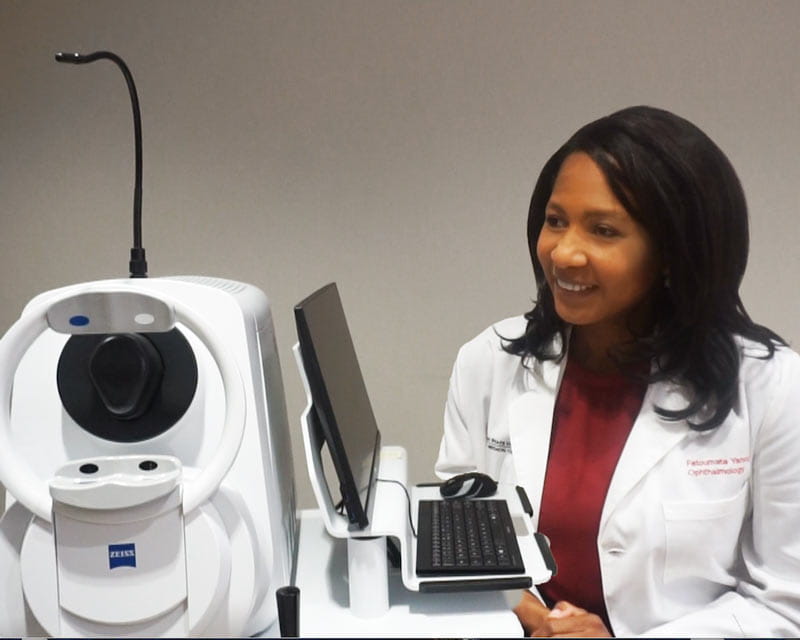
Swept-source OCT angiography reveals exquisite details of ocular structures
 The addition of a genetic counselor to the Department of Ophthalmology and Visual Sciences at The Ohio State University Wexner Medical Center expands the level of comprehensive care for inherited retinal diseases.
The addition of a genetic counselor to the Department of Ophthalmology and Visual Sciences at The Ohio State University Wexner Medical Center expands the level of comprehensive care for inherited retinal diseases.
Taylor Sabato, MPH, MMSc, partners with patients and works alongside physicians to improve access to the latest treatments, increase understanding of emerging knowledge and attract more clinical trials to the Ohio State campus.
The department is investing in teams and systems to support the work required for molecular medicine, says ophthalmologist Thomas Mendel, MD, PhD. His translational lab explores gene therapies for inherited retinal diseases.
“We are moving past exam findings and images and moving toward molecular precision,” Dr. Mendel says. “We can get to the underlying cause of a patient’s disease and, for the first time in history, we can offer care that leads to improvements.”
A physical exam and photos can show a physician that a patient has a retinal condition, but it doesn’t pinpoint which disease is present. Having a genetic counselor on the team gives patients immediate access to genetic testing to get answers more quickly and help create a treatment plan, Dr. Mendel says.
With fewer than 50 genetic counselors specializing in ophthalmology in the United States, Dr. Mendel says it’s a “clinical luxury” to have Sabato on the team.
As Sabato builds her practice and collaboration with colleagues, she’ll offer additional resources essential to increasing the level of personalized eye care.
“I can help provide some of the pieces for people who are just finding out what is going on with their eye health,” Sabato says. “We can track the condition through their family and measure the risk for other family members.”
Sabato spends a significant amount of time with patients, helping them gain a strong understanding of genetic testing through pre- and post-test counseling.
“It’s a huge benefit to the patient,” Dr. Mendel says. “It’s really meaningful and goes beyond just being patient-facing.”
He pushed to add a genetic counselor to the clinic because, despite the training and expertise he and his colleagues possess, they don’t have the detailed knowledge Sabato brings to the table.
“She is educating our whole team about the latest findings that define a disease or variant that now may be classified as its own condition,” Dr. Mendel says.
Sabato supplements the care physicians deliver, adding a layer of professional precision. She specializes in diagnosing and identifying inherited retinal diseases, including:
Genetic testing for retinal conditions covers more than 350 different genes. Treatments for these conditions are being explored and tested through clinical trials, allowing many patients to take part. Sabato ensures patients understand their options and helps them enroll if they choose to participate.
The field of ophthalmology is exploding with clinical trials and research tied to gene therapies, Dr. Mendel says. That means patients have treatment options.
“There is a lot of interest in the field right now, and funders are looking for this kind of bench-to-bedside work,” Dr. Mendel says.
Sabato’s role within the department is twofold. When the team reviews patient cases during weekly rounds, Sabato provides a rich interpretation with her vast insight and knowledge. She researches potential clinical trials available at Ohio State and elsewhere for each patient. Dr. Mendel says having a genetic counselor on the team ensures nothing is left on the table when it comes to patient care.
As a genetics expert, Sabato also will help Dr. Mendel and other ophthalmology colleagues attract more clinical trials and research related to inherited retinal conditions to The Ohio State University Comprehensive Cancer Center – Arthur G. James Cancer Hospital and Richard J. Solove Research Institute.
“There are only a handful of centers around the world doing this,” Dr. Mendel says. “We want to be part of getting these gene therapies ready for FDA approval and leading investigator-led trials here.”
Patients already are reaping the benefits of Sabato’s expertise. A patient who recently received surgery for a retinal detachment had subretinal fluid that wasn’t clearing despite a successful surgery.
Dr. Mendel looked at the pigmentation in the patient’s eyes and found an unusual pattern. When he asked the patient about a family history of pigmentation conditions, she shared that three of her children had a related condition.
“I very quickly pulled in Taylor to see if something else was happening here,” Dr. Mendel says.
By the end of the day, Sabato had a few hypotheses about what gene might be involved and the patient had an appointment to discuss genetic testing for inherited retinal disease.
“That is the kind of conversation that doesn’t happen unless you have a genetic counselor on the team,” Dr. Mendel says.
Part of Sabato’s passion for genetic testing is driven by the fact that many inherited retinal conditions also involve other body systems. When patients are diagnosed, they also can be informed of other potential conditions and plan for preventive care.
“We might see something in the retina that also might have implications for cancer, hearing loss or heart disease,” Sabato says.
That example shows the power of genetic testing and counseling to extend “beyond the eyeball,” Sabato says. She looks forward to watching the field grow in the years to come, helping countless patients along the way.